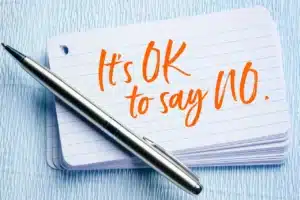
We hear the word, “boundaries”, all the time. We are told to set them, respect them, and utilize them. Boundaries exist in the workplace, in the home, at school, in social settings, and anywhere in between. Setting boundaries can be incredibly helpful for aiding our mental health and wellness journey, but it’s often easier said than done.
What exactly is a boundary?
A boundary is a clear expectation of what a person will and will not accept. A boundary is placed to protect our health, wellness, well-being, and comfort. A boundary is not a rule. A boundary is not a quick fix. And unfortunately, a boundary is not guaranteed to be respected just because it was communicated.
Although setting and maintaining boundaries can take effort, holding boundaries is important. Boundaries can seem impossible, especially if the other party pushes back. Many people struggle with setting boundaries as oftentimes the person who the boundaries are meant to protect you from will continue to try and break right through them.
A simple formula for setting a boundary is:
What do I need, or not need, to happen + what will happen if this is not respected.
Being clear about our boundaries and holding to them is crucial. It is also important to remember that a boundary is not intended to change someone’s behavior; we cannot change others, especially if they do not desire to change. A boundary is meant to state what you will do if a particular behavior occurs to protect yourself from continued harm, disrespect, or discomfort. Sort of like, “If you do this… I will do this…” for example, “If you continue to berate me, I will no longer talk to you….”
When it comes to setting boundaries, there is a difference between selfish, selfless, and self-preservation. Selfish says I only care about myself. Selfless says I only care about you. And self-preservation says I care about you, but not at my own expense. This is essentially what boundaries come down to. You are not saying you don’t care about the other person; you are saying that you care about them and respect them, but there are certain things that you will and will not accept.
Setting and holding boundaries takes practice. Sometimes this may come with heavy feelings of guilt or blame. When setting boundaries ask yourself, is there a reason I am setting this boundary? Have I communicated my needs clearly? Has the other person listened to my feelings and my needs? What do I need to feel safe and secure?
When done with love and respect, setting boundaries is not selfish, it is self-preservation. This will help your relationships flourish and grow and help model for your children how to have healthy relationships.
By Jillian Amodio, MSW, Contributor, Mental Health





 The Goal is Growth, Not Perfection
The Goal is Growth, Not Perfection